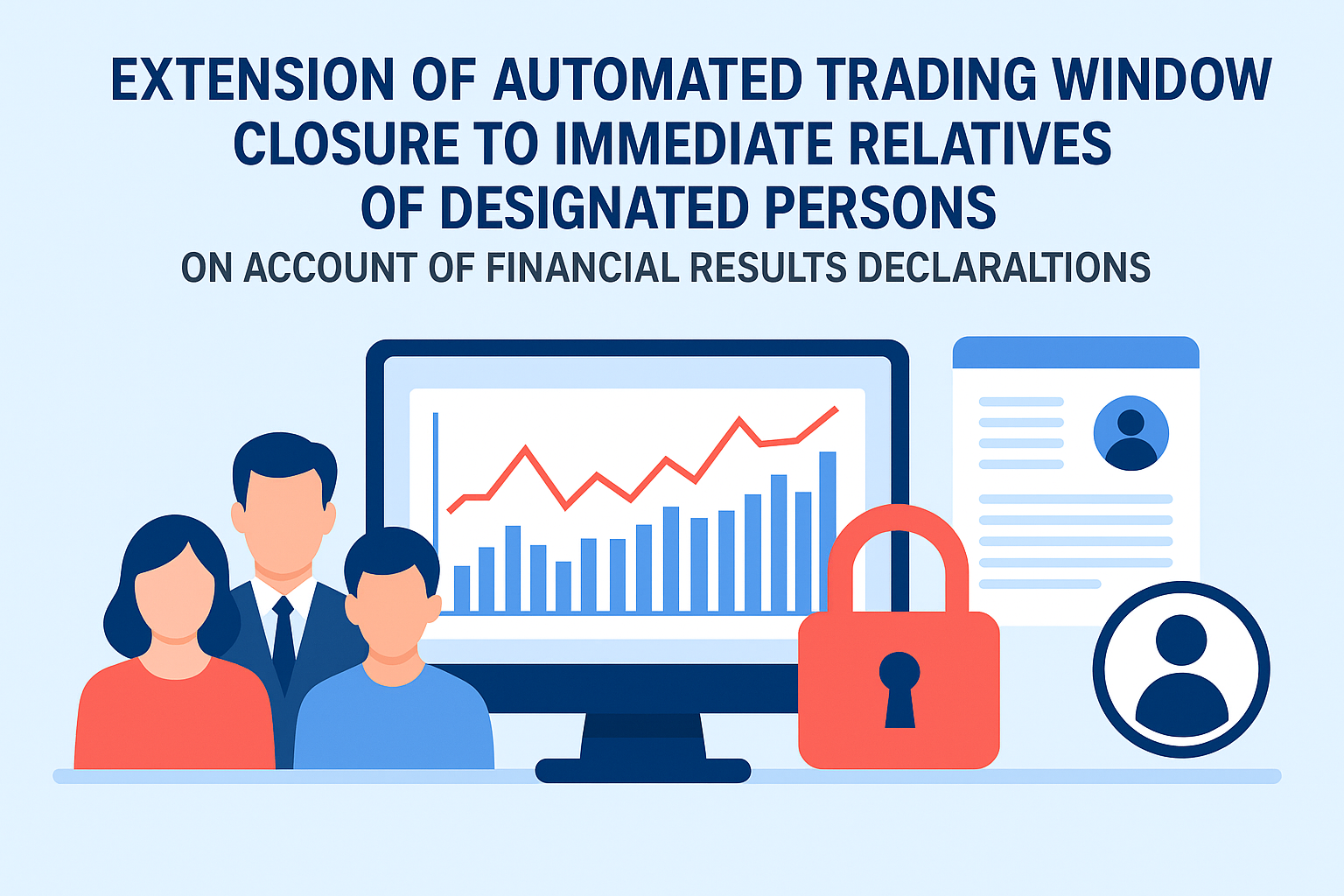View News
EXTENSION OF AUTOMATED IMPLEMENTATION OF TRADING WINDOW CLOSURE TO IMMEDIATE RELATIVES OF DESIGNATED PERSONS, ON ACCOUNT OF DECLARATION OF FINANCIAL RESULTS

Extension of Automated Trading Window Closure to Immediate Relatives of Designated Persons
On Account of Financial Results Declarations – A Comprehensive Overview
Background
On April 21, 2025, SEBI issued Circular No. SEBI/HO/ISD/ISD-PoD-2/P/CIR/2025/55 to strengthen compliance under the Prohibition of Insider Trading (PIT) Regulations, 2015. The circular expands the automated trading-window closure mechanism to include the immediate relatives of Designated Persons (DPs) during financial results declaration periods.
Earlier, trade restrictions were electronically enforced only for DPs, while ensuring compliance by immediate relatives was the manual responsibility of DPs. This new system-driven approach now automatically restricts trades by immediate relatives, significantly reducing the risk of inadvertent insider trading.
Key Highlights
1. Extension of Automated Freeze Scope
-
The PAN-ISIN freeze, applied during trading-window closures, will now cover both DPs and their immediate relatives.
2. Phased Implementation Timeline
| Phase | Companies Covered | PAN-ISIN Freeze Start Date |
|---|---|---|
| Phase 1 | Top 500 companies by BSE market capitalization as of March 31, 2025 (listed on BSE, NSE, MSEI) | July 1, 2025 |
| Phase 2 | All other listed companies (existing and newly listed) | October 1, 2025 |
3. Operational Mechanism
-
Designated Depositories (DDs) receive DP and immediate relative data from listed companies.
-
Companies specify the trading window closure period (from quarter-end to 48 hours post-results declaration) via DD portals.
-
DDs freeze PANs at the security level for DPs and their immediate relatives, sharing the data with stock exchanges and other depositories.
-
During the freeze, no on-market, off-market, or pledge-related transactions are permitted.
4. Exemption Mechanism
-
Companies may request exemptions for specific individuals through the system.
-
Exemption requests are processed, and restrictions are lifted within two trading days of approval.
5. Reporting & Compliance
-
Depositories must submit quarterly reports to SEBI, including:
-
Number of companies covered
-
Number of PANs frozen
-
Exemptions granted
-
Who Are Immediate Relatives?
“Immediate relative” refers to the spouse of a person, and includes the parent, sibling, or child of the person or the spouse, if any of them are financially dependent on the person or consult the person in making securities trading decisions.
Action Checklist for Listed Companies
-
Identify all DPs and their immediate relatives and collect PAN and demat account details (if PAN is unavailable).
-
Submit details to the Designated Depository at least 2 trading days before the start of each quarterly trading window closure.
-
Monitor and update data regularly—any additions or deletions must be reflected within 2 trading days.
-
Maintain documentation for exemptions requested under Regulation 9 of the PIT Regulations.
-
Coordinate with DDs to ensure accurate freeze/unfreeze processes and confirm system-based enforcement of trading restrictions.
Concluding Thoughts
SEBI’s circular dated April 21, 2025, represents a significant step in enhancing insider trading regulations. By making PAN-ISIN freezes system-driven for both DPs and their immediate relatives, the framework evolves from manual compliance to robust, automated enforcement.
Listed companies should align internal processes promptly to comply with the July 1, 2025 and October 1, 2025 implementation deadlines.
DISCLAIMER:
The contents of this document are based on current laws and available information. Every effort has been made to ensure accuracy, but no responsibility is assumed for errors or omissions. This information does not constitute legal advice, and no liability is accepted for consequences arising from its use. Users should refer to applicable laws and regulationsfor compliance purposes.
From the Desk of CS SHARATH

